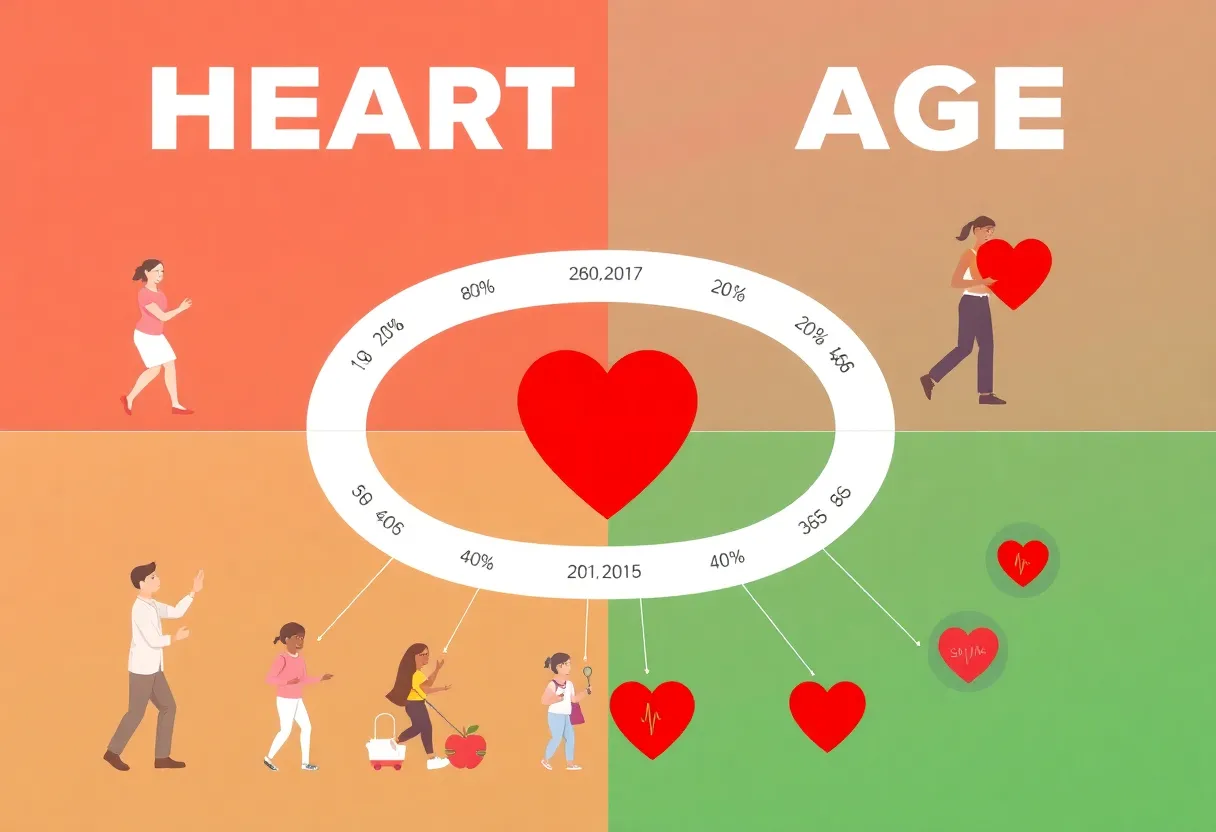Chicago, July 31, 2025
News Summary
A study by Northwestern Medicine found that many U.S. adults have a ‘heart age’ significantly older than their chronological age, especially among men and various racial demographics. The research analyzed over 14,000 adults, revealing average heart ages of 56.7 years for men and 55.4 years for women. Disparities were notably pronounced in Black and Hispanic populations, highlighting the need for greater cardiovascular health awareness. The study introduced a calculator to help individuals understand their heart health better and will be published in JAMA Cardiology in July 2025.
Chicago
A recent study conducted by Northwestern Medicine has revealed that many adults across the United States have a “heart age” that is significantly older than their actual chronological age, with some disparities exceeding a decade. This finding underscores not only the prevalence of cardiovascular disease risks among U.S. adults but also highlights the urgent need for greater awareness and preventive care.
The study, which evaluated over 14,000 U.S. adults aged 30 to 79 from the National Health and Nutrition Examination Survey conducted between 2011 and 2020, found that men’s heart age is, on average, 56.7 years, while women’s heart age averages 55.4 years. This is notably higher than their chronological ages of 49.7 and 51.3 years, respectively.
The analysis revealed pronounced disparities based on gender, education, income levels, and racial demographics. About one-third of men with a high school diploma or less possess a heart age more than 10 years older than their actual age. A deeper examination of racial and ethnic differences showed that Black men, on average, have a heart age that is 8.5 years older than their chronological age, and Black women have a gap of 6.2 years. Hispanic men average a heart age 7.9 years older, while Hispanic women have a 4.8-year gap. White men and women have heart ages 6.4 and 3.7 years older than their respective chronological ages, while Asian men and women average a heart age 6.7 years and 2.8 years older.
To aid individuals in understanding their cardiovascular risks, Northwestern scientists developed a free online calculator that computes a person’s heart age based on various risk factors, including blood pressure, cholesterol levels, smoking habits, and diabetes status. This tool is intended to improve discussions between doctors and patients regarding heart disease risk and preventive therapies, offering a more relatable metric than the traditional percentage-based risk assessments.
While the calculator serves as a valuable resource, the study emphasizes that it is not a substitute for professional clinical care and should be used alongside consultations with healthcare providers. Dr. Sadiya Khan, the lead author of the study, indicates that fostering an understanding of heart age may encourage individuals, particularly the younger population, to recognize their potential risk of developing heart disease and motivate them to take preventive measures.
This study, titled “PREVENT Risk Age Equations and Population Distribution in US Adults,” will be published in JAMA Cardiology on July 30, 2025. With heart disease being the leading cause of death in the United States, the researchers aim to change how cardiovascular risk is communicated to the public. Further research will be necessary to determine whether presenting risk in terms of heart age effectively improves patient outcomes and understanding of preventive health measures.
FAQ
What is heart age?
Heart age refers to an estimation of an individual’s cardiovascular health based on various risk factors, potentially differing from their chronological age.
How can I calculate my heart age?
A free online calculator developed by Northwestern Medicine allows individuals to estimate their heart age by assessing factors like blood pressure, cholesterol levels, and lifestyle habits.
Why is understanding heart age important?
Understanding heart age can help individuals comprehend their risk for cardiovascular disease more intuitively, prompting discussions with healthcare providers about prevention and management.
What demographics were found to have an older heart age?
The study indicated that disparities in heart age are particularly pronounced among men, individuals with lower education and income levels, and those who identify as Black or Hispanic.
When will the study be published?
The study will be published in JAMA Cardiology on July 30, 2025.
Key Features of the Study
| Feature | Findings |
|---|---|
| Average Heart Age for Women | 55.4 years |
| Average Heart Age for Men | 56.7 years |
| Disparity among Black Men | 8.5 years older |
| Disparity among Black Women | 6.2 years older |
| Disparity among Hispanic Men | 7.9 years older |
| Disparity among Hispanic Women | 4.8 years older |
| Disparity in White Men | 6.4 years older |
| Disparity in White Women | 3.7 years older |
| Disparity in Asian Men | 6.7 years older |
| Disparity in Asian Women | 2.8 years older |
Deeper Dive: News & Info About This Topic
HERE Resources
Gabbard Makes Bold Allegations Against Obama in Intelligence Debate
Grand Canyon Lodge Lost to Wildfires: A Tragic Loss
Global Childhood Obesity Rates Surge
HHS Secretary Dismisses Vaccine Advisory Panel
Enormous Wildfires Rage Across Canada, Prompting Emergency Declarations
Pittsburgh Faces Air Quality Struggles in Latest Report
Harvard University Faces Funding Crisis Amid Tensions
Healthcare Crisis Strikes Delaware County as Crozer Health Closes Its Doors
Healthcare Crisis in Pennsylvania: The Closure of Crozer-Chester Medical Center and Taylor Hospital
Nationwide Recall of Enoki Mushrooms by Harvest NYC Inc
Additional Resources
- The Washington Post: Heart Biological Age and Cardiovascular Disease
- STAT: Most Americans’ Hearts Older than Chronological Age
- Medical Xpress: Adults’ Hearts Older than Actual Age
- Today: Heart Age Study and Calculator
- BuzzFeed: Heart Cardiovascular Age
- Wikipedia: Heart Disease
- Google Search: Cardiovascular Disease
- Google Scholar: Heart Age Calculator
- Encyclopedia Britannica: Heart
- Google News: Heart Disease
Author: STAFF HERE PHILADELPHIA WRITER
The PHILADELPHIA STAFF WRITER represents the experienced team at HEREPhiladelphia.com, your go-to source for actionable local news and information in Philadelphia, Philadelphia County, and beyond. Specializing in "news you can use," we cover essential topics like product reviews for personal and business needs, local business directories, politics, real estate trends, neighborhood insights, and state news affecting the area—with deep expertise drawn from years of dedicated reporting and strong community input, including local press releases and business updates. We deliver top reporting on high-value events such as Mummers Parade, Philadelphia Flower Show, and Thanksgiving Day Parade. Our coverage extends to key organizations like the Greater Philadelphia Chamber of Commerce and United Way of Greater Philadelphia, plus leading businesses in telecommunications, food services, and healthcare that power the local economy such as Comcast, Aramark, and Children's Hospital of Philadelphia. As part of the broader HERE network, we provide comprehensive, credible insights into Pennsylvania's dynamic landscape.





